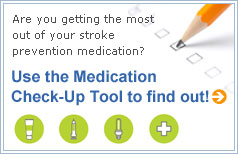How do medical conditions increase stroke risk?
The connection is simple - strokes can happen one of two ways:
- when a blood clot blocks blood flow to the brain (this causes 80% of strokes)
- when blood vessels burst in the brain
Medical conditions that increase the risk of blood clots or bursting blood vessels will also increase your stroke risk.
Which medical conditions could increase my stroke risk?
Atrial fibrillation
Atrial fibrillation, also called AFib, affects about 350,000 Canadians. For people with AFib, the risk of a stroke caused by a blood clot is 3 to 5 times what it would be otherwise. AFib causes up to 15% of all strokes, and one-third of all strokes in people over 60.
AFib causes the heart to beat abnormally. Blood pools in the heart, and when blood stands still it is more likely to clot. A clot from the heart could then travel through the bloodstream into the brain, where it could block a blood vessel, causing a stroke.
To learn more, see atrial fibrillation and stroke risk reduction.
Diabetes
Diabetes affected over 3 million Canadians in 2009, and this number is projected to rise to over 3.7 million by 2020. People with diabetes have a much higher death rate from stroke and heart attack than people without diabetes. The death rate from a stroke or heart attack is 3 times higher for men and 5 times higher for women if they have diabetes.
Diabetes makes it harder for cells in the body to use sugar for energy. Sugar stays in the blood, where it damages the blood vessels, making them more likely to become narrow or blocked. Diabetes also increases the risk of high blood pressure, which increases stroke risk on it own.
To learn more, see diabetes and stroke risk reduction.
High blood pressure:
High blood pressure affects 20% of Canadians. Controlling high blood pressure can reduce your stroke risk by up to 40%.
High blood pressure increases stroke risk by damaging blood vessels so they are more likely to clog or burst.
To learn more, see high blood pressure and stroke risk reduction.
High cholesterol
About 40% of Canadians have high cholesterol.
High cholesterol causes fatty deposits to build up in your blood vessels. This could block blood vessels in the brain and cause a stroke.
To learn more, see high cholesterol and stroke risk reduction
.
Some people have other medical conditions that put them at risk of stroke. Talk to your doctor
to learn more about your stroke risk and how to reduce the risk of a stroke.
What should I do to get these conditions under control?
Follow the treatment plan your doctor recommends, take your medications as directed, and have regular medical check-ups.
Talk to your doctor
about how to control your medical conditions.






